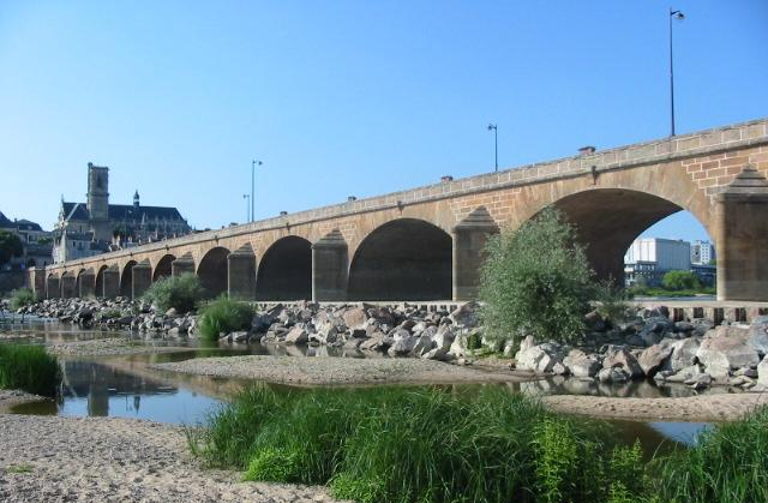At first, I thought there was something wrong with the air conditioning.

As Gen and I settled into our seats last Thursday, July 25th, on a train bound for Prague from Berlin, Germany, I passed my hand across an air vent along the base of the large window in our compartment. Something leaked out, barely. Air, I hoped. It was early afternoon on a hot day in a hot week and soon there were six of us in the cramped compartment, adding our body heat to the stuffy conditions. When would the air conditioning kick in, I wondered? It’s been years since I’ve traveled by rail in Europe, and never at peak summer, so I wasn’t hip to protocols for cooling down passengers. Maybe the train needed to be moving? A few kilometers after leaving the train station, I ran my hand over the vent again, testing the feeble flow. A half hour later I tried again. Nothing had changed. Maybe it was a mechanical problem? Back in Berlin, I had felt a twinge of concern as our train pulled up. It looked old. To save a few Euros, I had booked us in second class on a commuter run to Prague, where we had started our sojourn nine days earlier. The train seemed to be fine, however, and not noticeably different than the one that carried us to Berlin, a trip that hadn’t caused any discomfort. Maybe it was just a cultural thing. As an American, I’m accustomed to air conditioning everywhere I go (though we live comfortably without it at home in Santa Fe). In Europe, there seemed to be a different attitude toward the convenience, as we discovered in Berlin where nearly every building, including the national museums, lacked air conditioning. I understood why. Europe is temperate in the summer and I suspect Germans are keen to keep their energy use as low as possible.
Still, something seemed wrong. An hour into our train ride, we were sweating – a lot. There was no way to open the window and the feeble air supply hadn’t changed, except to die briefly when we pulled into a station. Between the heat and the humidity, the compartment became a sauna. Fortunately, we had brought plenty of water for the four-hour ride. And as former field archaeologists Gen and I were used to sweaty discomfort. I glanced at our fellow travelers. The middle-aged man wearing European-styled glasses seated next to Gen seemed unperturbed by the heat (he disembarked in Dresden). The other passengers were three cheerful young adults from Ireland, judging by their accents, traveling with a larger group. They had disappeared into their smart phones as soon as we left Berlin, though occasionally they spoke short sentences to one another. They, too, were apparently unfazed by the conditions. Meanwhile, the heat continued to build. Gen fanned herself with a map. I wiped my face on a sleeve as I watched farm country roll past under a cloudless sky. Maybe I was just being a wimp, I thought to myself. It had been a while since Gen and I had done any hard traveling, preferring to stay home and keep our carbon footprint as low as possible. Maybe I had gone soft in middle age. Then I heard two words that changed everything.
“Heat wave,” one of the Irish lads announced, looking up from his phone.

And not just any heat wave, as I learned when we turned on the TV in our hotel room later that evening. It was a record-smashing heat wave. In Paris, the thermometer hit 108.7° F (42.6° C) while were travelling, demolishing a record that stood since 1947 by an astonishing (in the words of a meteorologist) four degrees. Germany set an all-time national record of 108°, surpassing the previous mark by nearly four degrees – a mark set just the previous day! It was a similar story in Belgium and the Netherlands. Both hit 107°, destroying previous highs by six and five degrees respectively (prompting experts to use the word “astonishing” again). According to the Royal Netherlands Meteorological Institute, temperatures had never risen above 104 degrees in recorded history. The Met office in England reported a reading of 101.7° at Cambridge University, breaking the previous record of 101.3°, set in 2003, and marking only the second time temperatures had ever reached triple digits in the UK. No wonder our train compartment had become a sauna! I could certainly sympathize with a story in the New York Times I read upon our return about a Eurostar train in Belgium that had broken down and passengers were not allowed to open windows or leave the train for three hours out of safety concerns. A passenger was quoted saying “I have never been so hot in my life.”
The real news, however, wasn’t how many records had been broken across the continent but by how much they had been surpassed, said researchers. New all-time records are usually set incrementally, most often by only a few tenths of a degree. But the records that fell last week were obliterated. Another word used by weather and climate experts to describe what happened is one appearing in more and more news stories and scientific reports recently: unprecedented. Whether the topic is heat waves, flooding, fires, or rates of melting, everyone seems to keep using the word. We’re entering unchartered territory. As Marshall Shepherd, director of the University of Georgia’s atmospheric sciences program said in news story about the heat wave, the obliteration of all-time temperature records have “established an entirely new baseline.” It should be setting off loud and persistent warning sirens. Employing a medical analogy about a fast-rising fever, Shepard said “If you have a temperature of 99.6 degrees, it is alarming…103 degrees would send you right to the doctor.”

Worse, it was Europe’s second fever in less than a month. A June heat wave also set temperature records (2° Celsius above normal on average) earning the month the worrisome title as the hottest June ever on the continent. Not coincidently, it was also the warmest June ever globally, according to the World Meteorological Organization and NOAA. Nine of the ten warmest Junes have occurred since 2010 (1998 is ranked eighth). 2019 saw the forty-third consecutive June with temperatures above the twentieth century average. In fact, the hottest summers in Europe in the past five hundred years have all occurred in the past seventeen years, according to the New York Times story. I wasn’t thinking about unprecedented weather, however, as I planned our trip to Prague and Berlin. I did keep an eye on the June heat wave, breathing a sigh of relief as temperatures fell back down into the “normal” range. It was high summer, so we knew it would be quite warm – and packed accordingly. But another record-breaking heat wave? I didn’t even consider the possibility or think twice about it as temps rose during our time in Berlin earlier last week (abetted by my decision to unplug from the Internet when we left home). I did note the lack of air conditioning, but, hey, were in Europe! How bad could it be? Bad as it turned out.
And it’s just the beginning. The influence of climate change on last week’s heat wave was unmistakable, scientists said in numerous articles. And there would be more, hotter, heat waves in the future. Our fingerprints are all over this troubling development. “Every heat wave occurring in Europe today is made more likely and more intense by human-induced climate change,” wrote the authors of a preliminary study published by the World Weather Attribution, an international scientific collaboration, about the June heat wave. In a news article, Radley Horton, a climate researcher at Columbia University said “The verdict is in: Increasing greenhouse gas concentrations due to human activity – by raising average temperatures – have loaded the dice toward more frequent record breaking heat extremes.” Karsten Haustein, a climate scientist and meteorologist at the University of Oxford, tweeted: “This. Is. Climate. Change.” Perhaps most ominous, journalist Jack Holmes, writing in Esquire magazine (online) said this about 2019: “It’s the first summer of the rest of our lives.”

It’s not just Europe. This summer there have been unprecedented heat waves in South Korea, Japan, India, Alaska (whose largest city, Anchorage, set an all-time record high on July 4th), and the East Coast of the United States. As I write this the dome of heat that cooked Europe last week has settled in over Greenland, likely to cause massive melting of its precious glaciers. This avalanche of news came as a bit of a shock to me. Although I’ve worked in climate change for many years, mostly on the solution side of the crisis, none of the research I saw said conditions would deteriorate this fast. For example, James Hansen, the father of climate science, warned in his 2010 book Storms of My Grandchildren that heat waves would be more intense and more frequent with each passing year unless greenhouse gas emissions were reduced but he was writing about the world his grandchildren would inherit, I thought. Years from now, in other words. But it’s arriving much more quickly, evidenced by roasting Gen and I experienced in the train last Thursday.
The event reinforced the anguished question that I posed in my previous post: What Is Earth For? For us to roast? It’s beginning to look that way. Things are moving fast climatically – and very slowly politically. In a fitting but pathetic irony, the annual gathering of climate change deniers in Washington, D.C., organized by the heartless Heartland Institute, met on the 25th just as Paris broke its all-time record. Meanwhile, hundreds of thousands of young protestors around the world, led by courageous sixteen-year old Swedish activist Greta Thunberg, have mobilized all year in a desperate attempt to provoke governments into action and salvage something of their collective future. However, in another sign of the times, a day before the record-breaking 25th, Thunberg was publicly mocked by right-wing lawmakers as she spoke to the French National Assembly in Paris! It boggles the mind.

The events of the past week have put many things into perspective suddenly for me. I have known for some time that we were careening toward a precipice from which we might not recover, but I always assumed we had time to take corrective action. However, the speed at which the world has approached the precipice – now only a few years away, say the experts – puts my personal journey into sharper focus. The transition from the ‘precedented’ world that I grew up in to the ‘unprecedented’ world that has begun to take hold has happened entirely within my lifetime. On the one hand, I’m not at all shocked. I’ve been worried about our destructive habits for nearly all my life, first through the lens of archaeology, then land conservation, followed by my activism with the Quivira Coalition. Figuring out how “live on a patch of land without ruining it” as conservationist Aldo Leopold once described the “oldest task in history” has been the central tenet of my work. That includes my nonfiction books, of course, but also my photographic projects as well as my novel-writing. One might call it a ‘career’ interest in conservation and sustainability, via anguished questions, though I’ve always considered my path to be more akin to an artist’s journey than a researcher’s investigation (right brain/left brain). But events this summer have cast my work and interests in a somewhat different light, which I am still sorting out. This includes things I saw and learned during the rest of our journey to Prague and Berlin, which I’ll discuss in my next post.
Teaser photo credit: By Cypris – Own work, CC BY-SA 3.0






